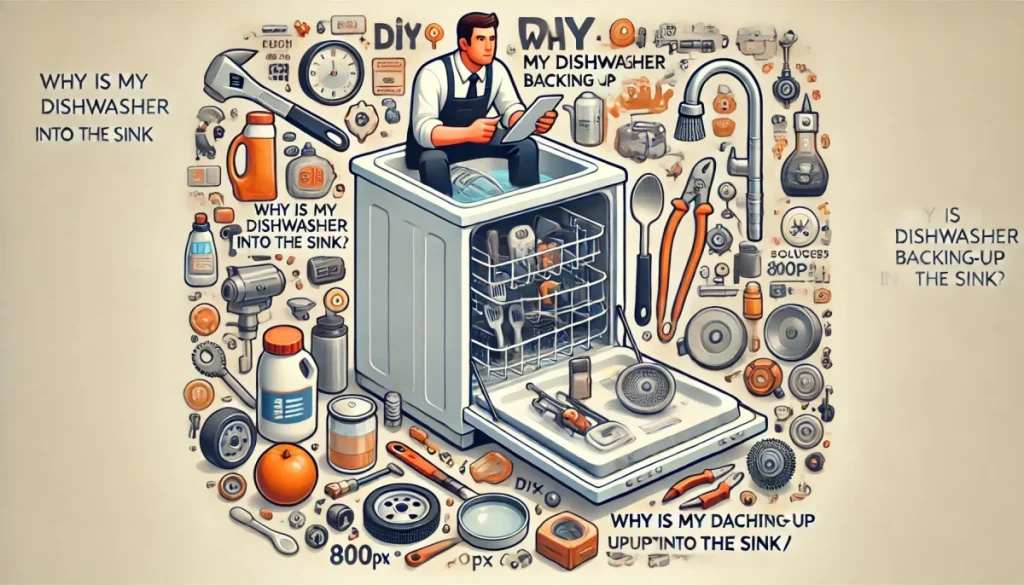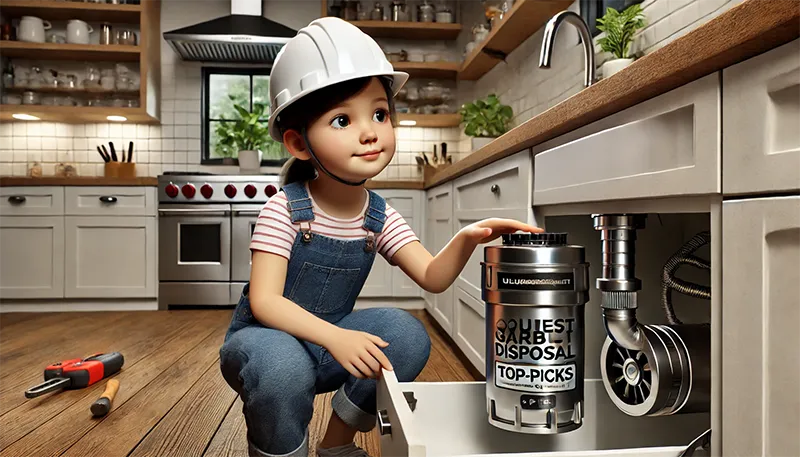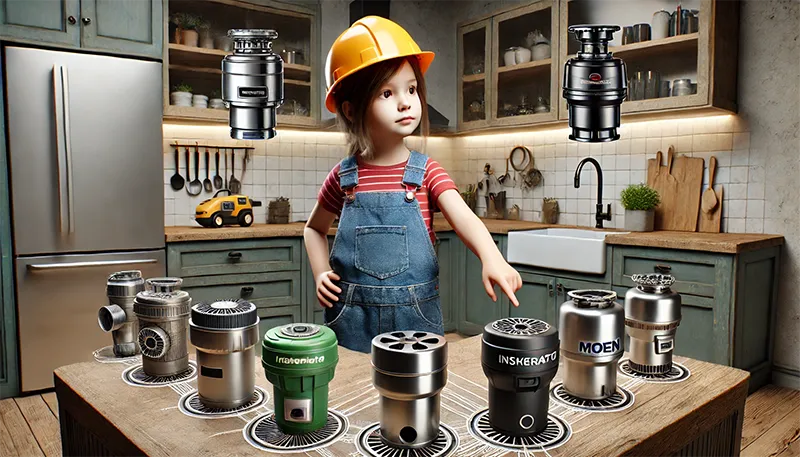It can be frustrating to find dirty water backing up into your sink while running the dishwasher. This issue not only disrupts the cleaning process but also creates an unsanitary mess in your kitchen. If you’re asking, “Why is my dishwasher backing up into the sink?”, you’re not alone. Many homeowners face this problem, and while it can be a bit alarming, the good news is that it’s usually caused by a few common issues that can be resolved without professional help.
Most dishwashers and sinks share the same drain line, so a blockage in the system can easily cause water to back up into your sink.
In this guide, we’ll explain the typical reasons for dishwasher backups and provide effective solutions to resolve and prevent the issue. Whether it’s a clogged drain or an installation mistake, we’ve got you covered with the right fixes.
Common Reasons Why Dishwasher Backing Up Into the Sink
There are several potential reasons why your dishwasher might be backing up into the sink. Understanding these common causes is the first step toward fixing the problem.
Blocked or Clogged Garbage Disposal
If your dishwasher is connected to a garbage disposal, a clog in the disposal is one of the most common reasons for a backup. Food scraps, grease, and other debris can clog the disposal, preventing proper drainage and causing water to back up into the sink when the dishwasher runs.
Improperly Installed or Clogged Dishwasher Drain Hose
The dishwasher drain hose plays a key role in directing wastewater away from the appliance. If the hose is improperly installed—specifically, if it lacks a high loop or air gap—wastewater can flow back into the dishwasher and sink. Additionally, clogs in the drain hose caused by food particles or debris can restrict water flow, leading to backups.
Issues with the Sink Drain or Pipes
A clog in the sink drain or pipes can also cause water from the dishwasher to back up into the sink. The dishwasher shares the same drainpipe as the sink, so if there’s a blockage in the plumbing, water won’t be able to flow out properly, resulting in backups.
Faulty Air Gap or Missing High Loop
An air gap or high loop is a critical component of the dishwasher’s drain system, designed to prevent backflow. If the air gap is clogged or the drain hose isn’t installed with a high loop, dirty water can easily flow back into the dishwasher and sink.
How the Dishwasher Drain System Works
Understanding how your dishwasher’s drain system works can help explain why backups occur. Your dishwasher and sink share the same drainage system, meaning that water from both the sink and dishwasher flows through the same pipes. When the dishwasher pumps out water, it uses the drain line connected to either the sink drain or garbage disposal.
For this system to work smoothly, the water needs to flow in one direction—away from the dishwasher and sink. A properly installed drain system will have an air gap or a high loop to prevent backflow, which stops dirty water from returning to the dishwasher or sink.
However, if there’s a clog in the garbage disposal, drain hose, or pipes, it disrupts this flow, causing water to back up. Backups can also occur when the dishwasher’s drain hose is not properly positioned or if it lacks the necessary high loop or air gap. In these cases, wastewater has nowhere to go and ends up flowing back into your sink.
Step-by-Step Solutions to Fix Dishwasher Backups
Now that we’ve covered the common causes of dishwasher backups, let’s explore how to fix the issue. Follow these steps to resolve the problem and prevent future backups.
Step 1: Check and Clear the Garbage Disposal
If your dishwasher is connected to a garbage disposal, the first step is to check for a clog. Turn off the dishwasher and run the garbage disposal with cold water for about 30 seconds to clear any debris. Avoid putting grease or fibrous foods into the disposal, as these can cause clogs.
Step 2: Inspect the Dishwasher Drain Hose
Next, check the dishwasher’s drain hose for clogs or improper installation. Disconnect the hose from both the dishwasher and sink or garbage disposal and inspect it for blockages. If the hose is clogged, use a flexible brush or a plumber’s snake to clear it. If the hose is improperly positioned, make sure it’s installed with a high loop or air gap.
Step 3: Unclog the Sink Drain
If the garbage disposal and drain hose are clear, the problem may lie in the sink drain or pipes. Use a plunger to try and dislodge any blockages in the drain. If the blockage persists, you can use a natural drain cleaner (such as a baking soda and vinegar solution) to help break down clogs. Avoid using chemical drain cleaners, as they can damage your plumbing.
Step 4: Install a High Loop or Air Gap
If your dishwasher drain hose doesn’t already have a high loop or air gap, it’s time to install one. The high loop involves positioning the drain hose in an upward loop, at least 20 inches above the floor, to prevent backflow. Alternatively, an air gap can be installed on the sink or countertop to ensure water flows out correctly without backing up.
By following these steps, you should be able to fix most dishwasher backup issues and get your kitchen back to normal.
How to Prevent Future Dishwasher and Sink Backups
Preventing future backups is all about maintaining the components of your dishwasher and sink. Here are some effective tips to keep your drains flowing smoothly:
Clean the Garbage Disposal Regularly
Avoid dumping large food scraps, grease, or fibrous foods into the garbage disposal, as these can cause clogs. Clean the disposal regularly by grinding ice cubes and citrus peels to clear out debris and maintain its performance.
Clean the Dishwasher Filter
The dishwasher’s filter collects food particles and debris, preventing them from entering the drain system. Clean the filter regularly to prevent blockages. Remove the filter, rinse it under warm water, and scrub away any food particles or buildup.
Use Natural Cleaners to Keep Drains Clear
Periodically clean your sink and dishwasher drains using natural cleaners like baking soda and vinegar. These solutions help break down grease and buildup in the pipes, preventing clogs from forming.
Inspect the Drain Hose
Check the dishwasher’s drain hose regularly to ensure it’s free of kinks, clogs, or damage. Replace the hose if you notice any issues, and make sure it’s installed with a high loop or air gap to prevent backflow.
By incorporating these maintenance tips into your routine, you’ll reduce the likelihood of future dishwasher backups.
Common Mistakes That Cause Dishwasher Backups
Several mistakes can lead to dishwasher backups, many of which can be easily avoided:
Failing to Remove the Knockout Plug
When installing a new dishwasher, it’s crucial to remove the knockout plug from the garbage disposal. If the plug isn’t removed, wastewater won’t be able to drain properly, causing backups in both the dishwasher and sink.
Not Running Enough Water Through the Garbage Disposal
After using the garbage disposal, it’s important to run cold water for at least 15-30 seconds to flush out any remaining debris. Failing to do this can result in clogged pipes and dishwasher backups.
Incorrect Drain Hose Installation
Improper drain hose installation is a common cause of dishwasher backups. Make sure the hose is installed with a high loop or air gap to prevent backflow.
Ignoring Regular Maintenance
Regularly cleaning the garbage disposal, dishwasher filter, and drain hose is essential to prevent buildup and clogs. Neglecting maintenance leads to more frequent backups and plumbing issues.
Avoiding these common mistakes will help keep your dishwasher and sink draining properly.
FAQs
-
Why does my dishwasher back up into the sink when I run it?
This issue is often caused by a clogged garbage disposal, a blocked drain hose, or an improperly installed drain system. Clearing clogs and ensuring the drain hose is installed correctly should fix the problem.
-
How can I stop my dishwasher from backing up into the sink?
Clear the garbage disposal, ensure the drain hose has a high loop or air gap, and check for any blockages in the sink drain. These steps should resolve the issue.
-
Can a clogged sink drain cause my dishwasher to back up?
Yes, a clogged sink drain can prevent proper drainage from the dishwasher, leading to water backing up into the sink.
-
What’s the best way to prevent dishwasher backups?
Regular maintenance of the garbage disposal, sink drain, and dishwasher filter can help prevent backups. Also, ensure the dishwasher drain hose is installed correctly.
-
Do I need a plumber to fix dishwasher backups?
Most dishwasher backups can be fixed with DIY methods, but if the problem persists, it may be time to call a plumber to inspect the drainage system.
Conclusion
Dishwasher backups into the sink are a common problem but one that can often be resolved with some simple fixes. Whether it’s a clogged garbage disposal, a blocked drain hose, or an issue with your sink’s plumbing, understanding the causes of these backups can help you take the right steps to fix them. Regular maintenance and proper installation of the dishwasher drain system are key to preventing future issues.
Follow these solutions to fix your dishwasher backups and keep your kitchen clean and functional!



